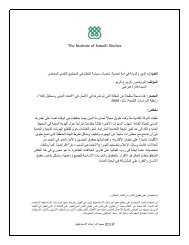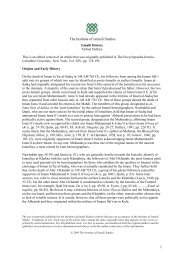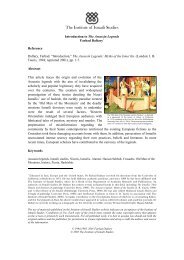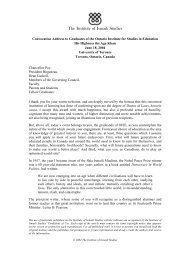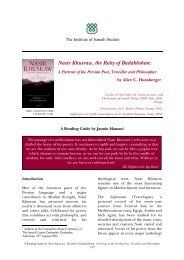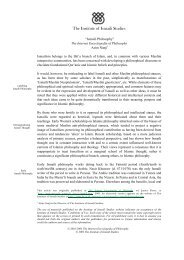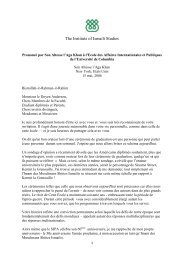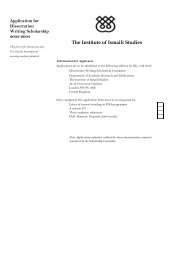Arbitration and Mediation in the Shia Imami Ismaili Muslim Community
Arbitration and Mediation in the Shia Imami Ismaili Muslim Community
Arbitration and Mediation in the Shia Imami Ismaili Muslim Community
Create successful ePaper yourself
Turn your PDF publications into a flip-book with our unique Google optimized e-Paper software.
The Institute of <strong>Ismaili</strong> Studies<br />
“<strong>Arbitration</strong> <strong>and</strong> <strong>Mediation</strong> <strong>in</strong> <strong>the</strong> Shi‘a <strong>Imami</strong> <strong>Ismaili</strong> <strong>Muslim</strong> <strong>Community</strong>”<br />
Paper presented at <strong>the</strong> 4 th International Conference of <strong>the</strong> World <strong>Mediation</strong> Forum *<br />
Mohamed M. Keshavjee, LLM (London) **<br />
May 10, 2003<br />
Sheraton Hotel & Convention Centre, Buenos Aires, Argent<strong>in</strong>a<br />
Abstract<br />
Trac<strong>in</strong>g <strong>the</strong> development of conciliation,<br />
arbitration <strong>and</strong> mediation through <strong>the</strong> Qur’an,<br />
<strong>the</strong> sunna <strong>and</strong> examples from early <strong>Muslim</strong><br />
history, <strong>the</strong> author illum<strong>in</strong>ates <strong>the</strong> place of<br />
conflict resolution <strong>in</strong> early <strong>Muslim</strong> thought <strong>and</strong><br />
elucidates <strong>the</strong> <strong>in</strong>stitutional expression of this<br />
practice <strong>in</strong> <strong>the</strong> <strong>Ismaili</strong> <strong>Muslim</strong> community.<br />
Provid<strong>in</strong>g an <strong>in</strong>troduction <strong>and</strong> overview to <strong>the</strong><br />
modern apparatus of <strong>the</strong> community <strong>in</strong> deal<strong>in</strong>g<br />
with cases of conflict, <strong>the</strong> author highlights <strong>the</strong> writ<strong>in</strong>gs of <strong>the</strong> Fatimid jurist Qadi Nu‘man (d.<br />
969) <strong>and</strong> exam<strong>in</strong>es <strong>the</strong> ord<strong>in</strong>ation of a modern constitution that is concerned with, amongst<br />
o<strong>the</strong>r th<strong>in</strong>gs, <strong>the</strong> social governance of <strong>the</strong> <strong>Ismaili</strong> community <strong>and</strong> <strong>the</strong> formalisation of a series<br />
of <strong>in</strong>stitutions dedicated to amicable resolution <strong>in</strong> cases of dispute. These bodies, known as<br />
<strong>the</strong> Conciliation <strong>and</strong> <strong>Arbitration</strong> Boards (CABs), operate today <strong>in</strong> Afghanistan, Canada,<br />
France, India, Iran, Kenya, Madagascar, Pakistan, Portugal, Syria, Tanzania, Ug<strong>and</strong>a, <strong>the</strong><br />
United K<strong>in</strong>gdom <strong>and</strong> <strong>the</strong> USA <strong>and</strong> <strong>in</strong> particular contexts are recognised as hav<strong>in</strong>g jurisdiction<br />
over matters of <strong>Ismaili</strong> personal law.<br />
This article is available on <strong>the</strong> website of The Institute of <strong>Ismaili</strong> Studies at http://www.iis.ac.uk/learn<strong>in</strong>g/<br />
life_long_learn<strong>in</strong>g/mediation/mediation.htm.<br />
* The World <strong>Mediation</strong> Forum (WMF) is an <strong>in</strong>ternational association of people, organisations <strong>and</strong> <strong>in</strong>stitutions<br />
<strong>in</strong>terested <strong>in</strong> <strong>in</strong>terpersonal, <strong>in</strong>tergroup, community, transcultural <strong>and</strong> <strong>in</strong>ternational mediation. It is committed to <strong>the</strong><br />
use of mediation <strong>and</strong> o<strong>the</strong>r appropriate collaborative conflict management processes wherever conflict threatens <strong>the</strong><br />
wellbe<strong>in</strong>g of <strong>in</strong>dividuals, organizations, communities <strong>and</strong> local, state or national governments. Created <strong>in</strong> Dubl<strong>in</strong>,<br />
Irel<strong>and</strong> <strong>in</strong> 1993, <strong>the</strong> WMF is <strong>the</strong> result of <strong>the</strong> First International Conference on <strong>Mediation</strong> <strong>and</strong> was formally constituted<br />
<strong>in</strong> El Escorial, Spa<strong>in</strong> <strong>in</strong> 1995. For more <strong>in</strong>formation, see <strong>the</strong>ir website http://www.mediate.com/world/.<br />
** Mohamed M. Keshavjee is a Barrister-at-Law from Gray’s Inn, London <strong>and</strong> an Advocate of <strong>the</strong> High Court of Kenya.<br />
S<strong>in</strong>ce 2000, he has been responsible for conceptualis<strong>in</strong>g <strong>and</strong> implement<strong>in</strong>g all tra<strong>in</strong><strong>in</strong>g programmes for <strong>the</strong> National<br />
Conciliation <strong>and</strong> <strong>Arbitration</strong> Boards of <strong>the</strong> <strong>Ismaili</strong> <strong>Muslim</strong> <strong>Community</strong> <strong>in</strong>ternationally <strong>and</strong> is presently a doctoral<br />
c<strong>and</strong>idate at <strong>the</strong> University of London concentrat<strong>in</strong>g on Alternative Dispute Resolution <strong>and</strong> <strong>Muslim</strong> societies <strong>in</strong> <strong>the</strong><br />
‘diaspora.’<br />
The author would like to acknowledge <strong>the</strong> assistance received from Dr Karim Janmohamed <strong>and</strong> Mr Shams Vellani of<br />
The Institute of <strong>Ismaili</strong> Studies, London <strong>and</strong> Mr Firoz Dossa of <strong>the</strong> International Conciliation <strong>and</strong> <strong>Arbitration</strong> Board <strong>in</strong><br />
<strong>the</strong> preparation of this paper.<br />
The use of materials published on <strong>the</strong> Institute of <strong>Ismaili</strong> Studies website <strong>in</strong>dicates an acceptance of <strong>the</strong> Institute of<br />
<strong>Ismaili</strong> Studies’ Conditions of Use. Each copy of <strong>the</strong> document must conta<strong>in</strong> <strong>the</strong> same copyright notice that<br />
appears on <strong>the</strong> screen or pr<strong>in</strong>ted by each transmission. For all published work, it is best to assume you should ask<br />
both <strong>the</strong> orig<strong>in</strong>al authors <strong>and</strong> <strong>the</strong> publishers for permission to (re)use <strong>in</strong>formation <strong>and</strong> always credit <strong>the</strong> authors<br />
<strong>and</strong> source of <strong>the</strong> <strong>in</strong>formation.<br />
© 2003 The Institute of <strong>Ismaili</strong> Studies
Madam President,<br />
Members of <strong>the</strong> Steer<strong>in</strong>g Committee,<br />
Ladies <strong>and</strong> Gentlemen,<br />
I would like to place on record that I consider it a great honour to be present <strong>in</strong> Buenos Aires<br />
today as a guest of <strong>the</strong> World <strong>Mediation</strong> Forum, <strong>and</strong> for this I would like to express my warm<br />
gratitude to <strong>the</strong> organisers of this conference.<br />
In a century ridden by <strong>in</strong>creas<strong>in</strong>g conflict <strong>and</strong> <strong>the</strong> witness<strong>in</strong>g of a new world order, <strong>in</strong>stitutions<br />
such as <strong>the</strong> World <strong>Mediation</strong> Forum can do a great deal to foster greater underst<strong>and</strong><strong>in</strong>g<br />
between, <strong>and</strong> among, nations, cultures, societies <strong>and</strong> peoples.<br />
The purpose of my presentation today is to share with you <strong>the</strong> experiences of an <strong>in</strong>ternational<br />
<strong>Muslim</strong> community which, throughout its history, has followed conciliation, mediation <strong>and</strong><br />
arbitration as processes of dispute resolution. The community I speak about is <strong>the</strong> Shi‘a<br />
<strong>Imami</strong> <strong>Ismaili</strong> <strong>Muslim</strong>s, of which I am a member <strong>and</strong> with whose <strong>in</strong>stitutions I have been<br />
closely <strong>in</strong>volved for <strong>the</strong> last forty years.<br />
The Shi‘a <strong>Imami</strong> <strong>Ismaili</strong> <strong>Muslim</strong>s, generally known as <strong>the</strong> <strong>Ismaili</strong>s, belong to <strong>the</strong> Shi‘a branch<br />
of Islam of which <strong>the</strong> Sunnis comprise <strong>the</strong> o<strong>the</strong>r. The <strong>Ismaili</strong>s live <strong>in</strong> over 30 countries of <strong>the</strong><br />
world, ma<strong>in</strong>ly <strong>in</strong> South <strong>and</strong> Central Asia, Africa, Europe <strong>and</strong> North America.<br />
Islam, like Judaism <strong>and</strong> Christianity, is a mono<strong>the</strong>istic faith whose most fundamental pr<strong>in</strong>ciple<br />
is <strong>the</strong> belief <strong>in</strong> <strong>the</strong> Supreme Be<strong>in</strong>g – God, or Allah <strong>in</strong> Arabic – who is unique <strong>and</strong> without<br />
equal or partners.<br />
<strong>Ismaili</strong>s affirm <strong>the</strong> fundamental Islamic Testimony of Truth, <strong>the</strong> shahada, that <strong>the</strong>re is no<br />
deity but Allah <strong>and</strong> that Muhammad (Peace of Allah be upon him) is His Messenger. They<br />
believe that Muhammad was <strong>the</strong> last <strong>and</strong> f<strong>in</strong>al Prophet of Allah, <strong>and</strong> that <strong>the</strong> Holy Qur’an,<br />
Allah’s f<strong>in</strong>al message to mank<strong>in</strong>d, was revealed through him.<br />
In common with o<strong>the</strong>r Shi‘i <strong>Muslim</strong>s, <strong>the</strong> <strong>Ismaili</strong>s affirm that after <strong>the</strong> Prophet’s death, ‘Ali b.<br />
Abi Talib (d. 661), <strong>the</strong> Prophet’s cous<strong>in</strong> <strong>and</strong> son-<strong>in</strong>-law, became <strong>the</strong> first imam – <strong>the</strong> spiritual<br />
leader of <strong>the</strong> <strong>Muslim</strong> community <strong>and</strong> that this spiritual leadership – known as imamat –<br />
cont<strong>in</strong>ues <strong>the</strong>reafter by heredity through ‘Ali <strong>and</strong> his wife Fatima, <strong>the</strong> Prophet’s daughter.<br />
Succession to <strong>the</strong> imamat, accord<strong>in</strong>g to Shi‘i doctr<strong>in</strong>e <strong>and</strong> tradition, is by way of nass or<br />
designation. It is <strong>the</strong> absolute prerogative of <strong>the</strong> imam-of-<strong>the</strong>-time to appo<strong>in</strong>t his successor<br />
from amongst any of his male descendants, whe<strong>the</strong>r <strong>the</strong>y be sons or remoter issue. His<br />
Highness Pr<strong>in</strong>ce Karim, Aga Khan IV, is <strong>the</strong> hereditary 49th Imam of <strong>the</strong> Shi‘a <strong>Imami</strong> <strong>Ismaili</strong><br />
<strong>Muslim</strong>s. Born on December 13th, 1936 <strong>in</strong> Geneva, Switzerl<strong>and</strong>, he spent his early childhood<br />
years <strong>in</strong> Nairobi, Kenya. He attended Le Rosey School <strong>in</strong> Switzerl<strong>and</strong> for n<strong>in</strong>e years <strong>and</strong><br />
graduated from Harvard University <strong>in</strong> 1959 with a BA Honours <strong>in</strong> Islamic History. He<br />
succeeded his gr<strong>and</strong>fa<strong>the</strong>r, Sir Sultan Muhammad Shah Aga Khan, as imam of <strong>the</strong> <strong>Ismaili</strong><br />
community on July 11 1957, at <strong>the</strong> age of 20.<br />
Spiritual allegiance to <strong>the</strong> imam <strong>and</strong> adherence to <strong>the</strong> Shi‘a <strong>Imami</strong> <strong>Ismaili</strong> persuasion of Islam,<br />
accord<strong>in</strong>g to <strong>the</strong> guidance of <strong>the</strong> imam-of-<strong>the</strong>-time, have engendered <strong>in</strong> <strong>the</strong> <strong>Ismaili</strong> community<br />
an ethos of unity, self reliance <strong>and</strong> a common identity. In a number of countries where <strong>the</strong>y<br />
…Please see copyright restrictions on page 1 Page 2
eside, <strong>the</strong> <strong>Ismaili</strong>s have evolved a well-def<strong>in</strong>ed <strong>in</strong>stitutional framework through which <strong>the</strong>y<br />
have, under <strong>the</strong> leadership <strong>and</strong> guidance of <strong>the</strong> imam, made far reach<strong>in</strong>g progress <strong>in</strong> <strong>the</strong><br />
educational, health, hous<strong>in</strong>g <strong>and</strong> economic spheres, establish<strong>in</strong>g schools, hospitals, health<br />
centres, hous<strong>in</strong>g societies <strong>and</strong> a variety of social <strong>and</strong> economic development <strong>in</strong>stitutions for<br />
<strong>the</strong> common good of all citizens, regardless of <strong>the</strong>ir race or religion.<br />
While I would like to give you a general background on <strong>the</strong> <strong>Ismaili</strong> community, more<br />
specifically, I would like to highlight <strong>the</strong> modern apparatus of <strong>the</strong> community’s social<br />
governance worldwide. It was <strong>the</strong> present Aga Khan’s gr<strong>and</strong>fa<strong>the</strong>r, Sir Sultan Muhammad<br />
Shah Aga Khan (d. 1957), who laid <strong>the</strong> foundation of <strong>the</strong> community’s <strong>in</strong>stitutional structures,<br />
build<strong>in</strong>g on <strong>the</strong> <strong>Muslim</strong> tradition of a communitarian ethic on <strong>the</strong> one h<strong>and</strong>, <strong>and</strong> responsible<br />
<strong>in</strong>dividual conscience, with freedom to negotiate one’s own moral commitment <strong>and</strong> dest<strong>in</strong>y,<br />
on <strong>the</strong> o<strong>the</strong>r <strong>in</strong> order to create new organisational structures as a way forward <strong>in</strong>to <strong>the</strong><br />
twentieth century.<br />
In 1905, he orda<strong>in</strong>ed <strong>the</strong> first <strong>Ismaili</strong> Constitution for <strong>the</strong> social governance of <strong>the</strong> community<br />
<strong>in</strong> eastern Africa. This, itself, was a very important step among o<strong>the</strong>rs, towards <strong>the</strong><br />
modernisation of <strong>the</strong> <strong>Ismaili</strong> community. It gave <strong>the</strong> community a form of adm<strong>in</strong>istration<br />
compris<strong>in</strong>g a hierarchy of councils at local, national <strong>and</strong> regional levels. It also set out rules of<br />
personal law <strong>in</strong> such matters as marriage, divorce <strong>and</strong> <strong>in</strong>heritance as well as guidel<strong>in</strong>es for<br />
mutual co-operation <strong>and</strong> support amongst <strong>the</strong> <strong>Ismaili</strong>s <strong>and</strong> <strong>the</strong>ir <strong>in</strong>terface with o<strong>the</strong>r<br />
communities. Similar constitutions were promulgated across <strong>the</strong> Indian subcont<strong>in</strong>ent. All of<br />
<strong>the</strong>m were periodically revised to address <strong>the</strong> community’s emerg<strong>in</strong>g needs <strong>and</strong><br />
circumstances.<br />
This tradition has cont<strong>in</strong>ued under <strong>the</strong> leadership of his successor, <strong>the</strong> present imam, His<br />
Highness Aga Khan IV, who from <strong>the</strong> 1970s extended <strong>the</strong> practice to o<strong>the</strong>r regions <strong>in</strong>clud<strong>in</strong>g<br />
<strong>the</strong> United States, Canada <strong>and</strong> several European countries as well as East <strong>and</strong> South Asia, <strong>the</strong><br />
Gulf, Syria, Iran <strong>and</strong> Afghanistan after a process of consultations with<strong>in</strong> each respective<br />
constituency. In 1986, he promulgated a s<strong>in</strong>gle constitution that, for <strong>the</strong> first time, brought<br />
under one aegis, <strong>the</strong> social governance of <strong>the</strong> worldwide <strong>Ismaili</strong> community, with built-<strong>in</strong><br />
flexibility to account for <strong>the</strong> diverse circumstances of different regions. Served by volunteers<br />
appo<strong>in</strong>ted by, <strong>and</strong> accountable to, <strong>the</strong> imam, <strong>the</strong> Constitution functions as an enabler to<br />
harness <strong>the</strong> best <strong>in</strong> <strong>in</strong>dividual creativity with<strong>in</strong> an ethos of group responsibility <strong>in</strong> order to<br />
promote <strong>the</strong> common weal. Like its predecessors, <strong>the</strong> Constitution is founded on each<br />
<strong>Ismaili</strong>’s spiritual allegiance to <strong>the</strong> imam-of-<strong>the</strong>-time, which is separate from <strong>the</strong> secular<br />
allegiance which <strong>the</strong>y owe as <strong>in</strong>dividual citizens to <strong>the</strong>ir respective national entities. While <strong>the</strong><br />
Constitution serves primarily <strong>the</strong> social governance needs of <strong>the</strong> <strong>Ismaili</strong> <strong>Community</strong>, its<br />
provisions for encourag<strong>in</strong>g amicable resolution of disputes, through impartial conciliation,<br />
mediation <strong>and</strong> arbitration, are be<strong>in</strong>g <strong>in</strong>creas<strong>in</strong>gly used, <strong>in</strong> some countries, by non-<strong>Ismaili</strong>s.<br />
Before I dwell on <strong>the</strong> Conciliation <strong>and</strong> <strong>Arbitration</strong> Boards, known as CABs, under <strong>the</strong> global<br />
<strong>Ismaili</strong> Constitution, I would like to touch on <strong>the</strong> ethos underp<strong>in</strong>n<strong>in</strong>g <strong>the</strong> whole structure. The<br />
<strong>in</strong>spiration for this is <strong>in</strong> <strong>the</strong> revelation of Islam <strong>and</strong> practice <strong>in</strong> <strong>the</strong> early period of Islamic<br />
history. This <strong>in</strong>spiration was to susta<strong>in</strong> <strong>and</strong> streng<strong>the</strong>n <strong>the</strong> spirit of community through<br />
harmony <strong>and</strong> <strong>the</strong> spirit of bro<strong>the</strong>rhood. The founta<strong>in</strong>head of this is <strong>the</strong> Holy Qur’an which<br />
constitutes <strong>the</strong> guid<strong>in</strong>g light for all <strong>Muslim</strong>s. The Qur’an says:<br />
…Please see copyright restrictions on page 1 Page 3
In ano<strong>the</strong>r ayat, <strong>the</strong> Qur’an states:<br />
If you fear a breach<br />
Between <strong>the</strong>m twa<strong>in</strong> (i.e. husb<strong>and</strong> <strong>and</strong> wife)<br />
Appo<strong>in</strong>t (two) arbiters,<br />
One from his family,<br />
And <strong>the</strong> o<strong>the</strong>r from hers;<br />
If <strong>the</strong>y wish for peace,<br />
Allah will cause<br />
Their conciliation:<br />
For Allah hath full knowledge,<br />
And is acqua<strong>in</strong>ted<br />
With all th<strong>in</strong>gs.<br />
Qur’an 4:39<br />
Allah doth comm<strong>and</strong> you<br />
To render back your Trusts<br />
To those to whom <strong>the</strong>y are due;<br />
And when ye judge<br />
Between man <strong>and</strong> man,<br />
That ye judge with justice:<br />
Verily how excellent<br />
Is <strong>the</strong> teach<strong>in</strong>g which He giveth you!<br />
For Allah is He who heareth<br />
And seeth all th<strong>in</strong>gs.<br />
Qur’an 4:31<br />
This concept of reconciliation <strong>and</strong> harmony is also found <strong>in</strong> <strong>the</strong> traditions (sunna) of <strong>the</strong><br />
Prophet Muhammad (Peace be upon him) whose life is filled with examples of mediated<br />
solutions to human problems. There is a story that <strong>in</strong> <strong>the</strong> reconstruction of <strong>the</strong> Ka‘ba, <strong>the</strong><br />
build<strong>in</strong>g <strong>in</strong> Mecca to which <strong>Muslim</strong>s go for pilgrimage, a dispute arose over <strong>the</strong> plac<strong>in</strong>g of <strong>the</strong><br />
Black Stone (Hajar al-aswad) <strong>in</strong>to <strong>the</strong> build<strong>in</strong>g. Each of <strong>the</strong> four tribes of <strong>the</strong> Quraysh wanted<br />
to have <strong>the</strong> honour of plac<strong>in</strong>g <strong>the</strong> stone to <strong>the</strong> exclusion of <strong>the</strong> o<strong>the</strong>rs. An impasse arose <strong>and</strong><br />
<strong>the</strong> matter was referred to <strong>the</strong> Prophet. He asked each of <strong>the</strong> contest<strong>in</strong>g tribes to choose a<br />
leader. He <strong>the</strong>n spread a full sheet of cloth on <strong>the</strong> floor <strong>and</strong> placed <strong>the</strong> stone <strong>in</strong> <strong>the</strong> centre,<br />
ask<strong>in</strong>g all four leaders to each hold it at one end <strong>and</strong> raise it toge<strong>the</strong>r. Thus, a serious conflict<br />
was averted by <strong>the</strong> Prophet’s prudent action <strong>in</strong> giv<strong>in</strong>g all four leaders an equal honour of<br />
plac<strong>in</strong>g <strong>the</strong> stone.<br />
‘Ali b. Abi Talib, <strong>the</strong> fourth caliph of Islam <strong>and</strong> <strong>the</strong> first Shi‘i imam, extolled <strong>the</strong> virtue of<br />
dialogue <strong>and</strong> <strong>the</strong> value of compromise. He likened <strong>the</strong> assistance given to solve human<br />
disputes to prayer <strong>and</strong> encouraged negotiated settlements with<strong>in</strong> <strong>the</strong> pr<strong>in</strong>ciples of <strong>the</strong> ethics of<br />
<strong>the</strong> faith.<br />
…Please see copyright restrictions on page 1 Page 4
In his ‘Instrument of Instructions’ to Malik b. Ashtar (d. 657), on his appo<strong>in</strong>tment as<br />
Governor of Egypt, ‘Ali def<strong>in</strong>ed justice as: ‘br<strong>in</strong>g<strong>in</strong>g to everyone what is his due’. Elaborat<strong>in</strong>g<br />
how this can be accomplished, he wrote: ‘Do justice to Allah <strong>and</strong> do justice to <strong>the</strong> people, as<br />
aga<strong>in</strong>st yourself, your near ones <strong>and</strong> those of your subjects for whom you have lik<strong>in</strong>g….’ 1 .<br />
‘Compassion,’ says Imam ‘Ali, to Malik, ‘must be adm<strong>in</strong>istered equitably for all without any<br />
prejudice whatsoever,’ stress<strong>in</strong>g <strong>the</strong>reby <strong>the</strong> pr<strong>in</strong>ciple of <strong>the</strong> unity of <strong>the</strong> human family.<br />
Referr<strong>in</strong>g to <strong>the</strong> citizenry, Imam ‘Ali said: ‘For <strong>the</strong>y are of two types: Ei<strong>the</strong>r your bro<strong>the</strong>r <strong>in</strong><br />
religion or your like, <strong>in</strong> creation’.<br />
Caliph Umar’s (d. 644) letter to Abu Musa al-Ashari (d. 638) on <strong>the</strong> eve of his appo<strong>in</strong>tment as<br />
<strong>the</strong> Qadi, is also very <strong>in</strong>structive. He said:<br />
Try to underst<strong>and</strong> <strong>the</strong> depositions that are made before you because it will be<br />
useless to consider a plea that is not valid. Consider all equal before you <strong>in</strong> <strong>the</strong><br />
court <strong>and</strong> (consider <strong>the</strong>m equal) <strong>in</strong> giv<strong>in</strong>g your attention to <strong>the</strong>m so that <strong>the</strong><br />
highly placed people may not expect you to be partial <strong>and</strong> <strong>the</strong> humble may not<br />
despair of justice from you. The claimant must produce evidence. An oath must<br />
be taken from <strong>the</strong> defendant. It is permissible to have compromise among<br />
<strong>Muslim</strong>s but not an agreement through which haram (unlawful) would be turned<br />
to halal (lawful) <strong>and</strong> vice versa…<br />
If you have given a judgement yesterday <strong>and</strong> today you may arrive to a correct<br />
op<strong>in</strong>ion upon re-th<strong>in</strong>k<strong>in</strong>g, you must not feel prevented from retract<strong>in</strong>g from your<br />
first judgement, because justice is primeval, <strong>and</strong> it is better to retract than to<br />
cont<strong>in</strong>ue <strong>in</strong> error. Use your own <strong>in</strong>dividual judgement about matters that perplex<br />
<strong>and</strong> about which nei<strong>the</strong>r an answer is found <strong>in</strong> <strong>the</strong> Qur’an <strong>and</strong> <strong>the</strong> sunna. Know<br />
<strong>the</strong> similitude <strong>and</strong> weigh <strong>the</strong> issues accord<strong>in</strong>gly (here Abu Musa is asked to use<br />
<strong>in</strong>dividual judgement <strong>and</strong> arrive to a logical conclusion through <strong>the</strong> use of qiyas<br />
<strong>and</strong> ijtihad). If one br<strong>in</strong>gs a claim, which he may or may not be able to prove,<br />
decide a time-limit for him. If he produces evidence with<strong>in</strong> <strong>the</strong> time-limit set (by<br />
you), you should allow his claim, o<strong>the</strong>rwise you are at liberty to give judgement<br />
aga<strong>in</strong>st him…<br />
Accord<strong>in</strong>g to a Shi‘i tradition, Imam Husayn (d. 680), <strong>the</strong> son of Imam ‘Ali, was once asked<br />
whe<strong>the</strong>r two persons, belong<strong>in</strong>g to his community, who fall out over <strong>the</strong> issue of debt or<br />
<strong>in</strong>heritance should refer <strong>the</strong> dispute to a secular authority. The Imam replied that <strong>the</strong> parties<br />
should refer to a qualified person from among his followers. Similar advice occurs <strong>in</strong> <strong>the</strong><br />
teach<strong>in</strong>gs of Imam Ja‘far al-Sadiq (d. 765), ano<strong>the</strong>r Shi‘i imam, who, for <strong>in</strong>stance, is reported<br />
to have said: ‘<strong>the</strong> charity which Allah loves <strong>the</strong> most is <strong>the</strong> peace re-established between<br />
quarrell<strong>in</strong>g parties.’<br />
The same pr<strong>in</strong>ciples are found <strong>in</strong> Fatimid Law. The Fatimids, a Shi‘a <strong>Ismaili</strong> dynasty, ruled<br />
Egypt from 969-1171. In his book Compendium of Fatimid Law, <strong>the</strong> noted Shi‘i legal scholar,<br />
Dr A. A. A. Fyzee, quotes Imam ‘Ali from <strong>the</strong> Da‘a’im al-Islam, a work compiled by <strong>the</strong><br />
foremost Fatimid jurist of <strong>the</strong> tenth century called al-Qadi al-Nu‘man (d. 974). He says that<br />
1 See S. Irtiza Husa<strong>in</strong>, ‘Ali - A Great Scholar of Div<strong>in</strong>e Law,’ DAWN, Karachi, December 18, 2000. The article is also<br />
available at http://www.dawn.com/2000/12/18/fea.htm.<br />
…Please see copyright restrictions on page 1 Page 5
accord<strong>in</strong>g to Imam ‘Ali, ‘The compos<strong>in</strong>g of differences between man is better than all manner<br />
of fasts <strong>and</strong> prayers.’<br />
Referr<strong>in</strong>g to <strong>the</strong> conduct of a qadi, Dr Fyzee quotes from <strong>the</strong> Fatimid text:<br />
The qadi should have patience; not show his displeasure to any party; give<br />
judgement only upon manifestly clear proof; know <strong>the</strong> law thoroughly; make no<br />
difference between layman <strong>and</strong> lawyer (<strong>in</strong> an argument <strong>in</strong> a suit); not accept any<br />
present from any party; not make any difference between high <strong>and</strong> low, <strong>the</strong><br />
strong <strong>and</strong> <strong>the</strong> poor.<br />
Fyzee fur<strong>the</strong>r states: ‘The qadi should also not hold court <strong>and</strong> perform his functions while he<br />
is angry or hungry or sleepy.’<br />
These pr<strong>in</strong>ciples of negotiated settlement, known as ‘sulh’ permeate <strong>the</strong> family law statutes of<br />
most <strong>Muslim</strong> countries, from Morocco to Bangladesh which provide that <strong>the</strong> judge must first<br />
establish a panel to explore <strong>the</strong> possibilities of a reconciliation. Though marriage <strong>in</strong> Islam is<br />
viewed as a contract <strong>and</strong> though divorce is allowed where <strong>the</strong> parties can no longer susta<strong>in</strong> a<br />
viable marriage, <strong>the</strong> dissolution of a marriage is not taken lightly.<br />
As <strong>in</strong> o<strong>the</strong>r sectors of human endeavour, such as education <strong>and</strong> economics, so also <strong>in</strong> <strong>the</strong><br />
sector of justice <strong>and</strong> dispute resolution, <strong>in</strong>stitutions <strong>and</strong> methodologies have evolved over time<br />
to serve <strong>the</strong> needs of successive generations of <strong>Muslim</strong>s. In <strong>the</strong> case of <strong>the</strong> <strong>Ismaili</strong> <strong>Muslim</strong>s,<br />
that evolution took place through <strong>the</strong> teach<strong>in</strong>gs of <strong>the</strong> Imam ‘Ali, successive imams, <strong>the</strong><br />
juridical work of <strong>the</strong> Fatimids <strong>and</strong> <strong>in</strong> recent years, through <strong>the</strong> ongo<strong>in</strong>g teach<strong>in</strong>gs of <strong>the</strong><br />
hereditary imams <strong>and</strong> <strong>the</strong> work of respected elders <strong>in</strong> various <strong>Ismaili</strong> communities.<br />
I will now dwell briefly on <strong>the</strong> modern <strong>in</strong>frastructure of dispute resolution <strong>in</strong> <strong>the</strong> <strong>Ismaili</strong><br />
<strong>Muslim</strong> <strong>Community</strong>. Under <strong>the</strong> global <strong>Ismaili</strong> Constitution promulgated <strong>in</strong> 1986, provision is<br />
made for a National Conciliation <strong>and</strong> <strong>Arbitration</strong> Board (NCAB) for each of <strong>the</strong> territories<br />
specified <strong>in</strong> <strong>the</strong> constitution <strong>and</strong> to be known as ‘His Highness Pr<strong>in</strong>ce Aga Khan Shi‘a <strong>Imami</strong><br />
<strong>Ismaili</strong> National Conciliation <strong>and</strong> <strong>Arbitration</strong> Board’ for <strong>the</strong> territory for which it is formed.<br />
Submission to <strong>the</strong> jurisdiction of <strong>the</strong> Board is made on a voluntary basis <strong>and</strong> <strong>the</strong> Boards are<br />
made up of trusted <strong>in</strong>dividuals, ma<strong>in</strong>ly volunteers, from various fields of endeavour from<br />
with<strong>in</strong> <strong>the</strong> <strong>Ismaili</strong> <strong>Community</strong>. The Boards’ ma<strong>in</strong> task is to assist <strong>in</strong> <strong>the</strong> conciliation process<br />
between parties <strong>in</strong> differences or disputes aris<strong>in</strong>g from commercial, bus<strong>in</strong>ess <strong>and</strong> o<strong>the</strong>r civil<br />
liability matters, domestic <strong>and</strong> family matters, <strong>in</strong>clud<strong>in</strong>g those relat<strong>in</strong>g to matrimony, children<br />
of a marriage, matrimonial property <strong>and</strong> testate <strong>and</strong> <strong>in</strong>testate succession.<br />
The Boards also act as an arbitration <strong>and</strong> judicial body <strong>and</strong> accord<strong>in</strong>gly hear <strong>and</strong> adjudicate<br />
upon commercial, bus<strong>in</strong>ess <strong>and</strong> o<strong>the</strong>r civil liability matters <strong>and</strong>; domestic <strong>and</strong> family matters<br />
<strong>in</strong>clud<strong>in</strong>g those relat<strong>in</strong>g to matrimony, children of a marriage, matrimonial property <strong>and</strong><br />
testate <strong>and</strong> <strong>in</strong>testate succession.<br />
The <strong>Ismaili</strong> Constitution outl<strong>in</strong>es <strong>the</strong> composition of <strong>the</strong> Boards <strong>and</strong> stipulates <strong>the</strong>ir tasks<br />
which, <strong>in</strong>ter alia, <strong>in</strong>clude provid<strong>in</strong>g rules of procedure <strong>and</strong> <strong>the</strong> authority to constitute Regional<br />
Conciliation <strong>and</strong> <strong>Arbitration</strong> Boards with<strong>in</strong> <strong>the</strong>ir jurisdictions. The National Conciliation <strong>and</strong><br />
<strong>Arbitration</strong> Board also functions as an appeal Board for any decision of any Regional<br />
Conciliation <strong>and</strong> <strong>Arbitration</strong> Board with<strong>in</strong> its jurisdiction.<br />
…Please see copyright restrictions on page 1 Page 6
At <strong>the</strong> <strong>in</strong>ternational level, <strong>the</strong> Constitution provides for an International Conciliation <strong>and</strong><br />
<strong>Arbitration</strong> Board (ICAB), composed of a Chairperson <strong>and</strong> six o<strong>the</strong>r members. The present<br />
panel is made up of lawyers from Canada (1), India (1) <strong>and</strong> <strong>the</strong> United K<strong>in</strong>gdom (2) as well as<br />
non-lawyers from Kenya (1) <strong>and</strong> Pakistan (1).<br />
The International Conciliation <strong>and</strong> <strong>Arbitration</strong> Board assists <strong>in</strong> <strong>the</strong> conciliation process<br />
between parties <strong>in</strong> differences or disputes aris<strong>in</strong>g from commercial, bus<strong>in</strong>ess <strong>and</strong> o<strong>the</strong>r civil<br />
liability matters, domestic <strong>and</strong> family matters, <strong>in</strong>clud<strong>in</strong>g those relat<strong>in</strong>g to matrimony, children<br />
of a marriage, matrimonial property, testate <strong>and</strong> <strong>in</strong>testate succession.<br />
The ICAB also acts as an arbitration <strong>and</strong> judicial body <strong>and</strong> accord<strong>in</strong>gly hears <strong>and</strong> adjudicates<br />
upon <strong>the</strong> above matters.<br />
The International Conciliation <strong>and</strong> <strong>Arbitration</strong> Board hears disputes that are <strong>in</strong>ternational <strong>in</strong><br />
scope but also acts as an appeal Board for appeals from decisions of any National Conciliation<br />
<strong>and</strong> <strong>Arbitration</strong> Board worldwide. A decision by <strong>the</strong> International Conciliation <strong>and</strong> <strong>Arbitration</strong><br />
Board is f<strong>in</strong>al, conclusive <strong>and</strong> b<strong>in</strong>d<strong>in</strong>g upon all <strong>the</strong> parties, provided <strong>the</strong>y have voluntarily<br />
submitted earlier to be so bound.<br />
It is worth mention<strong>in</strong>g that <strong>in</strong> certa<strong>in</strong> countries such as India, Kenya <strong>and</strong> Ug<strong>and</strong>a, <strong>the</strong> law of<br />
<strong>the</strong> l<strong>and</strong> recognises <strong>the</strong> <strong>Ismaili</strong> <strong>Community</strong>’s jurisdiction over many aspects of <strong>Ismaili</strong><br />
personal law. In <strong>the</strong>se countries, <strong>the</strong> NCABs function as tribunals with <strong>the</strong> authority to grant<br />
divorces <strong>and</strong> make custody <strong>and</strong> o<strong>the</strong>r ancillary orders. The ICAB also hears appeals from<br />
<strong>the</strong>se decisions.<br />
The <strong>Ismaili</strong> <strong>Community</strong>’s National Conciliation <strong>and</strong> <strong>Arbitration</strong> Boards are operative today <strong>in</strong><br />
Afghanistan, Canada, France, India, Iran, Kenya, Madagascar, Pakistan, Portugal, Syria,<br />
Tanzania, Ug<strong>and</strong>a, <strong>the</strong> United K<strong>in</strong>gdom <strong>and</strong> <strong>the</strong> USA. These Boards consist of outst<strong>and</strong><strong>in</strong>g<br />
volunteers rang<strong>in</strong>g from judges <strong>and</strong> lawyers to o<strong>the</strong>r professionals, bus<strong>in</strong>esspeople <strong>and</strong> home<br />
eng<strong>in</strong>eers.<br />
In keep<strong>in</strong>g with <strong>the</strong> present imam’s guidance, <strong>in</strong>ternational tra<strong>in</strong><strong>in</strong>g programmes were<br />
launched <strong>in</strong> Engl<strong>and</strong> <strong>in</strong> 2000 with a view to upgrad<strong>in</strong>g <strong>the</strong> skills of <strong>the</strong> many volunteers<br />
compris<strong>in</strong>g <strong>the</strong> network <strong>and</strong> thus streng<strong>the</strong>n<strong>in</strong>g <strong>the</strong> whole arbitration, mediation <strong>and</strong><br />
conciliation system worldwide.<br />
The <strong>Ismaili</strong> <strong>Community</strong>’s tra<strong>in</strong><strong>in</strong>g programmes, conducted by professionals from The<br />
Institute of <strong>Ismaili</strong> Studies <strong>in</strong> London, <strong>the</strong> School of Oriental <strong>and</strong> African Studies of London<br />
University <strong>and</strong> two lead<strong>in</strong>g British tra<strong>in</strong><strong>in</strong>g organizations: National Family <strong>Mediation</strong> (NFM)<br />
<strong>and</strong> <strong>the</strong> Centre of Dispute Resolution (CEDR) with subsequent tra<strong>in</strong><strong>in</strong>g programmes utilis<strong>in</strong>g<br />
professionals from Brita<strong>in</strong> <strong>and</strong> <strong>the</strong> <strong>in</strong>ternational <strong>Ismaili</strong> community have, to-date, tra<strong>in</strong>ed over<br />
400 mediators. In some countries, such as Portugal, <strong>the</strong> <strong>Ismaili</strong> NCAB tra<strong>in</strong><strong>in</strong>g programme<br />
tra<strong>in</strong>ed human resources <strong>in</strong> mediation for <strong>the</strong> M<strong>in</strong>istry of Justice.<br />
These tra<strong>in</strong><strong>in</strong>g programmes, based on a comb<strong>in</strong>ation of an elicitive <strong>and</strong> prescriptive model,<br />
embody some of <strong>the</strong> best practices available <strong>in</strong> <strong>the</strong> field. New <strong>in</strong>sights are be<strong>in</strong>g ga<strong>in</strong>ed from<br />
<strong>the</strong>m – particularly <strong>the</strong> need for greater underst<strong>and</strong><strong>in</strong>g of cross-cultural sensibilities.<br />
Alternative Dispute Resolution (ADR), as formulated today <strong>in</strong> <strong>the</strong> Western world, has a great<br />
deal to teach, but at <strong>the</strong> same time it also has a great deal to learn from cultures that have a<br />
much greater relational approach to both <strong>the</strong> conceptualisation of conflict <strong>and</strong> its resolution.<br />
…Please see copyright restrictions on page 1 Page 7
An <strong>in</strong>dividualistic approach to a problem, based on an assumption that each human be<strong>in</strong>g is an<br />
isl<strong>and</strong> on its own, may not work <strong>in</strong> societies where human be<strong>in</strong>gs are more closely woven <strong>in</strong>to<br />
a web of community relationships. Societies <strong>in</strong> Lat<strong>in</strong> America, Africa, Asia <strong>and</strong> many parts of<br />
<strong>the</strong> <strong>Muslim</strong> world have traditional approaches to resolv<strong>in</strong>g disputes with<strong>in</strong> a community<br />
sett<strong>in</strong>g which <strong>the</strong>y have been us<strong>in</strong>g long before <strong>the</strong> formal judicial apparatus came <strong>in</strong>to be<strong>in</strong>g.<br />
These approaches constitute natural pathways to dispute resolution. Re<strong>in</strong>vigorat<strong>in</strong>g <strong>the</strong>m<br />
would lead to giv<strong>in</strong>g back to <strong>the</strong>se societies <strong>the</strong> tools that <strong>the</strong>y have always been used to us<strong>in</strong>g<br />
<strong>and</strong> which, <strong>in</strong> real life, will work <strong>in</strong> ensur<strong>in</strong>g that <strong>the</strong> heal<strong>in</strong>g process that conflict resolution is<br />
supposed to engender, does, <strong>in</strong> fact, take place.<br />
The <strong>Ismaili</strong> Conciliation <strong>and</strong> <strong>Arbitration</strong> system is rooted <strong>in</strong> tradition, yet its modern<br />
<strong>in</strong>frastructure <strong>in</strong>terfaces comfortably with national legal systems which it fully respects <strong>and</strong><br />
with<strong>in</strong> whose boundaries <strong>the</strong> <strong>Ismaili</strong>s live <strong>and</strong> work. These Boards, like <strong>the</strong> <strong>Ismaili</strong><br />
Constitution, itself, are grounded, both <strong>in</strong> <strong>the</strong> ethics of <strong>the</strong> faith but also <strong>in</strong> <strong>the</strong> laws of <strong>the</strong> l<strong>and</strong><br />
where <strong>the</strong>y operate. They aim to give expression to a deep social conscience which<br />
characterises <strong>the</strong> community wherever it lives. In <strong>the</strong> words of His Highness <strong>the</strong> Aga Khan<br />
The <strong>Ismaili</strong>s have always prided <strong>the</strong>mselves on <strong>the</strong>ir highly developed social<br />
conscience. Our faith teaches us that we have obligations far beyond our own or<br />
even our family’s <strong>in</strong>terest. By <strong>the</strong> way you conduct your daily lives, by <strong>the</strong><br />
compassion you show to your fellowmen <strong>and</strong> women, <strong>and</strong> above all, by your<br />
faith <strong>in</strong> God, you will ultimately be judged. 2<br />
2 Speech of His Highness <strong>the</strong> Aga Khan, Installation Ceremony, Bombay, March 11, 1958.<br />
…Please see copyright restrictions on page 1 Page 8



